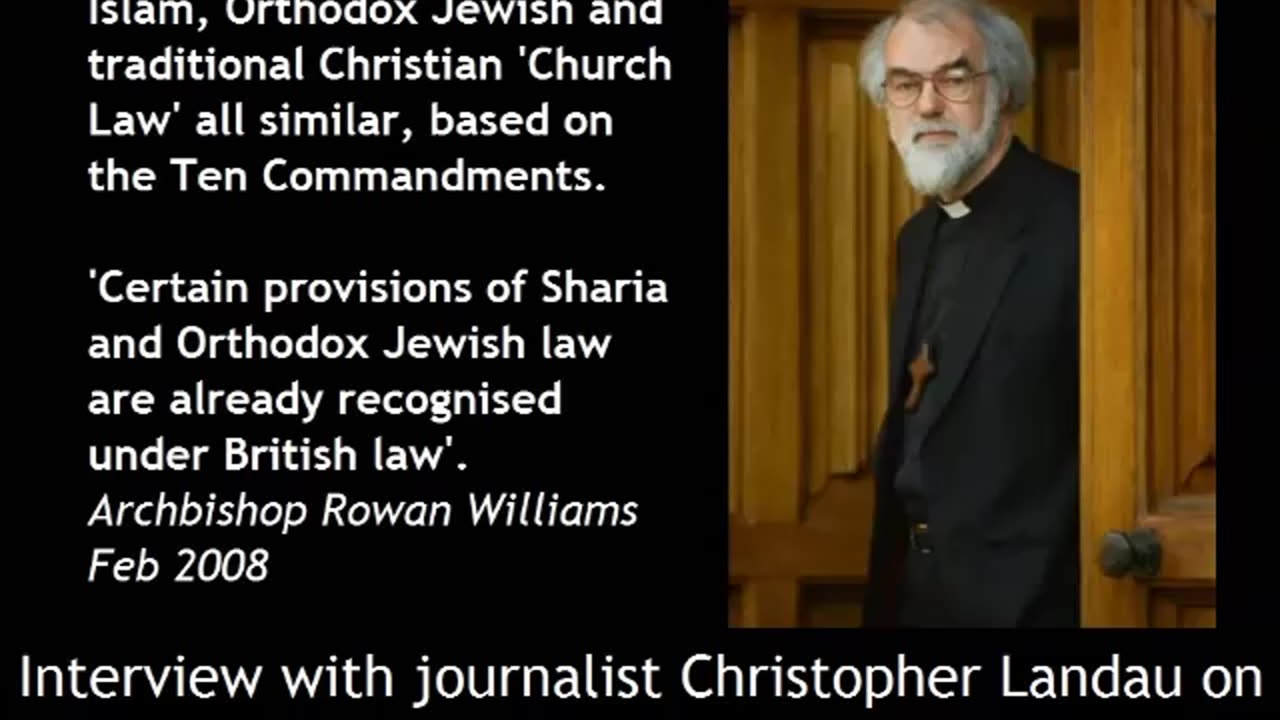Premium Only Content

Sharia Jewish & English Christian Church Law more similar than secular parliament law Rowan Williams
Archbishop on Radio 4 World at One - UK law needs to find accommodation with religious law codes Thursday 7th February 2008
Sharia law in UK is 'unavoidable' Dr Rowan Williams says Muslims should have a choice in legal disputes The Archbishop of Canterbury says the adoption of certain aspects of Sharia law in the UK "seems unavoidable".
http://news.bbc.co.uk/1/hi/7232661.stm
An interview with Christopher Landau of the BBC Radio 4 'World at One' programme, on the Temple lecture 'Civil and religious law in England: a religious perspective.'
The Archbishop of Canterbury, Dr Rowan Williams, has said that UK law needs to continue to find accommodation with religious legal codes such as the Islamic system of Sharia if community cohesion and development are to be achieved.
Speaking to the BBC ahead of the opening lecture in a series on Islam in English Law being given tonight to legal academics, in which he calls for the legal establishment to engage with these issues, Dr Williams said that the ability of the law of the land to accommodate religious perspectives, as it had already done with the Jewish Halacha, was essential:
"... certain provision of Sharia are already recognised in our society and under our law; so it's not as if we're bringing in an alien and rival system; we already have in this country a number of situations in which the internal law of religious communities is recognised by the law of the land as justified conscientious objections in certain circumstances in providing certain kinds of social relations."
Whilst speaking in the main about principles of Sharia law, the point applied generally to other religious principles:
"We have orthodox Jewish courts operating in this country legally and in a regulated way because there are modes of dispute resolution and customary provisions which apply there in the light of Talmud. It's not a new problem, not to mention the questions ... about how the consciences of Catholics, Anglicans and others who have difficulty over issues like abortion are accommodated within the Law; so the whole idea that there are perfectly proper ways in which the law of the land pays respect to custom and community; that's already there."
That, he said, did not mean that he was advocating the wholesale adoption of Sharia and certainly not the kinds of practical expressions of it seen in some parts of the world:
"... nobody in their right mind, I think, would want to see in this country a kind of inhumanity that sometimes appears to be associated with the practice of the law in some Islamic states [with] the extreme punishments, the attitudes to women as well."
Safeguards he said, were vital and UK law was in a strong position to provide these:
"...I think it would be quite wrong to say that we could ever licence so to speak a system of law for some communities which gave people no right of appeal, no way of exercising the rights that are guaranteed to them as citizens in general."
UK law needed to engage properly with the religious concerns and motivations of members of the communities which made up society he said;
"What we don't want I think is either a stand-off where the law squares up to religious consciences over something like abortion or indeed by forcing a vote on some aspects of the Human Fertilisation and Embryology Bill in the commons as it were a secular discourse saying 'we have no room for conscientious objections'; we don't want that, we don't either I think want a situation where because there's no way of legally monitoring what communities do, making them part of public process, people do what they like in private in such a way that that becomes a way of intensifying oppression within a community and that happens; that happens."
A full transcript of the interview follows:
Christopher Landau To begin with you've given this vision of if as a nation Britain wants to achieve social cohesion, that challenge is how to accommodate those of religious faith in relation to the law; and you're words are that the application of Sharia in certain circumstances if we want to achieve this cohesion and take seriously peoples' religion seems unavoidable?
-
 11:57
11:57
inspirePlay
19 hours ago $8.18 earnedLongest Drive Wins! Elite Long Drivers Battle in Par 4 Elimination
65.8K11 -
 8:44
8:44
RTT: Guns & Gear
21 hours ago $5.13 earnedStreamlight TLR RM2 Laser - G | The Best PCC Light
51.8K2 -
 36:38
36:38
Athlete & Artist Show
1 month ago $3.11 earnedNCAA Hockey Was A Joke, TNT Hockey Panel Is The Best In Sports
31.5K2 -
 1:00:08
1:00:08
Trumpet Daily
1 day ago $5.93 earnedBanning Mystery of the Ages - Trumpet Daily | Jan. 17, 2025
27K30 -
 15:10
15:10
Chris From The 740
1 day ago $3.49 earnedEAA Girsan Disruptor X 500-Round Review: Is It Reliable?
43.8K4 -
 1:00:38
1:00:38
PMG
19 hours ago $6.08 earnedCarnivore & Dr. Shawn Baker - Health Starts With Food
58.2K7 -
 1:28:13
1:28:13
Kim Iversen
20 hours agoCancelled Chef Pete Evans Exposes The One Change That Could End Big Food and Pharma
119K98 -
 4:20:21
4:20:21
Nerdrotic
21 hours ago $88.26 earnedDaradevil Born Again, Comics Industry CRASH, Neu-Hollywood REBUILD | Friday Night Tights #337
268K69 -
 1:32:34
1:32:34
Glenn Greenwald
17 hours agoThe Future of Gaza With Abubaker Abed; Journalist Sam Husseini On His Physical Expulsion From Blinken’s Briefing & Biden’s Gaza Legacy | System Update #391
146K107 -
 1:34:48
1:34:48
Roseanne Barr
20 hours ago $30.23 earnedWe are so F*cking Punk Rock! with Drea de Matteo | The Roseanne Barr Podcast #83
112K95